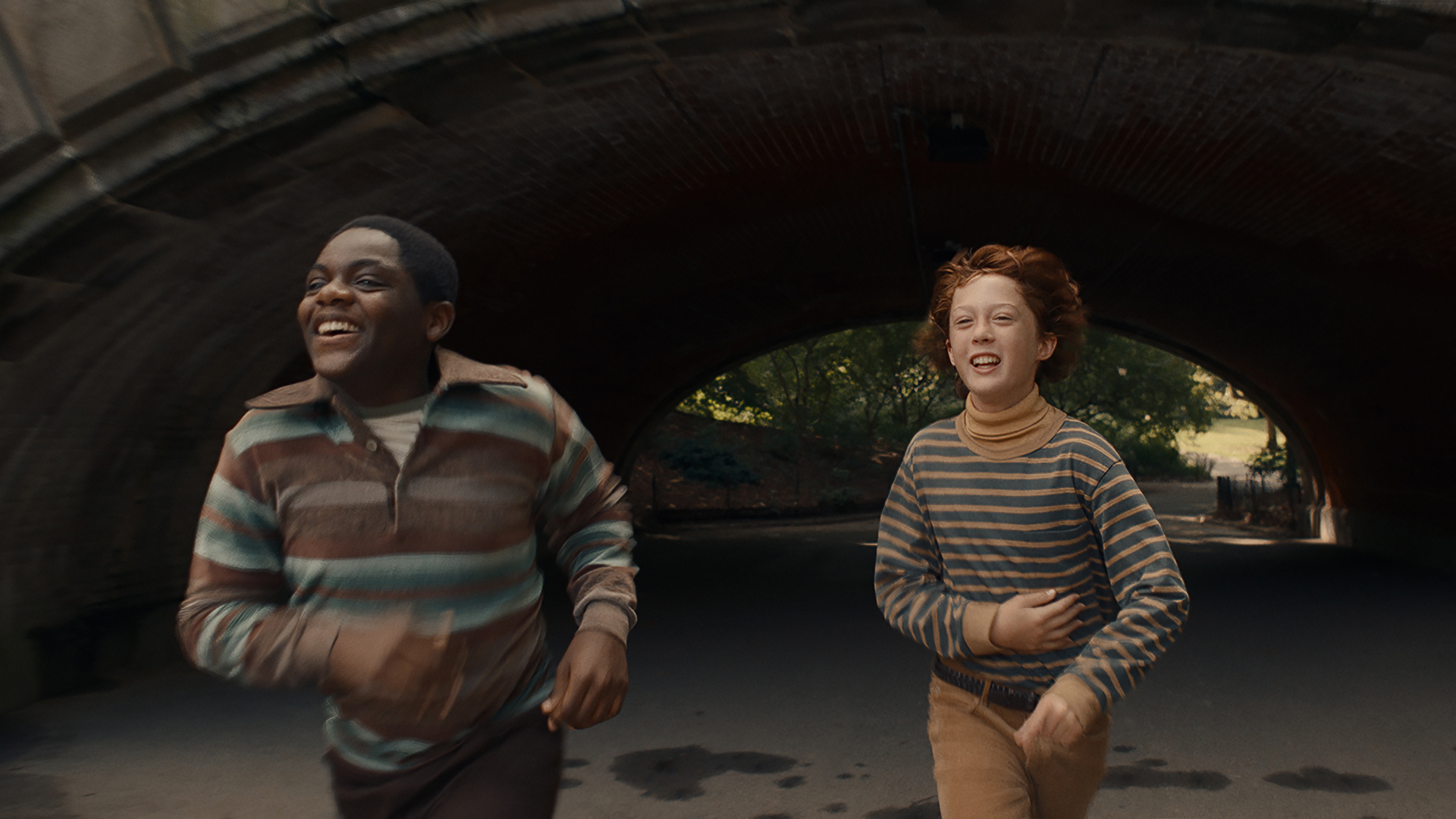GamesRadar+ Verdict
James Gray mines his own childhood for a warm, brazenly political coming-of-ager about the loss of innocence.
Why you can trust GamesRadar+
Call it coincidence, the pandemic effect, or evidence that a lot of filmmakers really liked Alfonso Cuarón's Roma, but cine-memoirs have become all the rage. Already this year we’ve had Branagh’s lyrical Belfast, Linklater’s fanciful Apollo 10 1/2, and still to come is Spielberg’s The Fabelmans. Director James Gray’s childhood has been writ large on screen as Armageddon Time, a richly textured, well-performed Reagan-era period piece that strains for contemporary relevance, but ultimately feels too safe and too uneventful to resonate.
Banks Repeta stars as Gray’s avatar on film, here going by Paul Graff. Just as Gray was, Graff is a student at Public School 173 in Queens in 1980, where he spends class time clowning around with his pal Johnny (Jaylin Webb), enraging their teacher Mr. Turkeltaub (who inevitably lands the nickname ‘Turkeytaub’). It’s during one of many joint punishments that Paul’s eyes are opened to the fact that Johnny – a black student from an underprivileged background – is treated differently by his white teacher because of the color of his skin.
Discrimination is not an alien concept in Paul’s home either given he is the descendant of Jewish immigrants. Grandfather Aaron (Anthony Hopkins) arrived in America via Ellis Island as a child and capitalized on the American Dream to the extent that he’s able to financially support Paul’s parents Esther (Anne Hathaway) and Irving (Jeremy Strong) in raising their two sons. Paul is largely oblivious to the history of persecution in his family – a fact that his adoring grandfather attempts to rectify with a series of tolerance-espousing, wisdom-filled homilies. But Paul is of an age where acting out comes naturally, eventually landing him in a highly disciplined private school where he comes face to face with the wave of bigoted, elitist Reagan-era exceptionalism sweeping America.
Armageddon Time isn’t the first instance of Gray mining his own family history on screen – his lavish 2013 feature The Immigrant is based on the memories of his grandparents, who feature prominently here as well. Perhaps because this is based on first-hand experience, Armageddon Time is a film that luxuriates in incidental but enriching details – the chaotic dinners, the grandfather’s description of spaghetti as “bloody worms” – but neither does it feel old fashioned, thanks in part to DoP Darius Khondji’s counterintuitively crisp lensing.

It’s just as transportive, in its own gently absorbing way, as Gray’s forays to the Amazon in The Lost City Of Z and the edge of the known universe in Ad Astra. You’d expect no less from Gray, an exacting filmmaker who sets the story over a two-month period leading up to Reagan’s election. The film is named for the song 'Armagidion Time', which The Clash covered as the B-side on 'London’s Calling' in 1979, as well as Reagan’s infamous ’79 interview in which he claimed “we might be the generation that sees Armageddon” – a moment that features on screen and is greeted with contempt by Paul’s liberal parents.
Gray, needless to say, isn’t shy about putting his political flag in the sand. At Paul’s elitist private school, the assembled students are visited by none other than Fred Trump (John Diehl) and his daughter Maryanne (played fleetingly by Jessica Chastain), who reinforce the idea of their god-given privilege. Moments later Paul is horrified when a fellow classmate casually and cruelly drops the N-word in the playground.
The parallels with the political moment that Gray was living through as he conceived Armageddon Time in the midst of the Trump presidency are far from subtle. Neither is it particularly thoughtfully explored. But it all feeds into Paul’s formative epiphany – eventually spelled out by his sage-like grandfather – that the ‘game is rigged’ for all but the few. The Graffs may be a relatively well off white family – privileged enough to send their two rebellious boys to an expensive private school – but they know they’ll never be fully accepted because of who they are and where they come from.
Repeta, center of the frame for most of the film, sells Paul’s early mischief and gradual loss of innocence exquisitely. Hopkins is on typically fine form as Paul’s wizened, warm-hearted grandfather, while Succession’s Jeremy Strong makes a lasting impression as Paul’s short-tempered father who’s quick to pull out the belt when Paul misbehaves. Hathaway has the least showy role of anyone on screen, but brings pathos to some challenging later scenes.
It’s a sensitive, sweet, frequently heartbreaking trip through deeply personal history, but there’s no getting round the fact that Gray had what most might consider a fairly typical childhood. The forced political parallels should perhaps have set alarm bells ringing that there wasn’t quite enough event or happenstance in Gray’s past for such authentic, unadorned autobiography. It should perhaps serve as a warning for filmmakers everywhere – not everyone’s childhood is worthy of the big screen treatment.
For more from Cannes Film Festival 2022 check out our review of God's Creatures, starring Normal People's Paul Mescal.
More info
| Genre | Drama |

I'm the Deputy Editor at Total Film magazine, overseeing the features section of every issue where you can read exclusive, in-depth interviews and see first-look images from the biggest films. I was previously the News Editor at sci-fi, fantasy and horror movie bible SFX. You'll find my name on news, reviews, and features covering every type of movie, from the latest French arthouse release to the biggest Hollywood blockbuster. My work has also featured in Official PlayStation Magazine and Edge.



